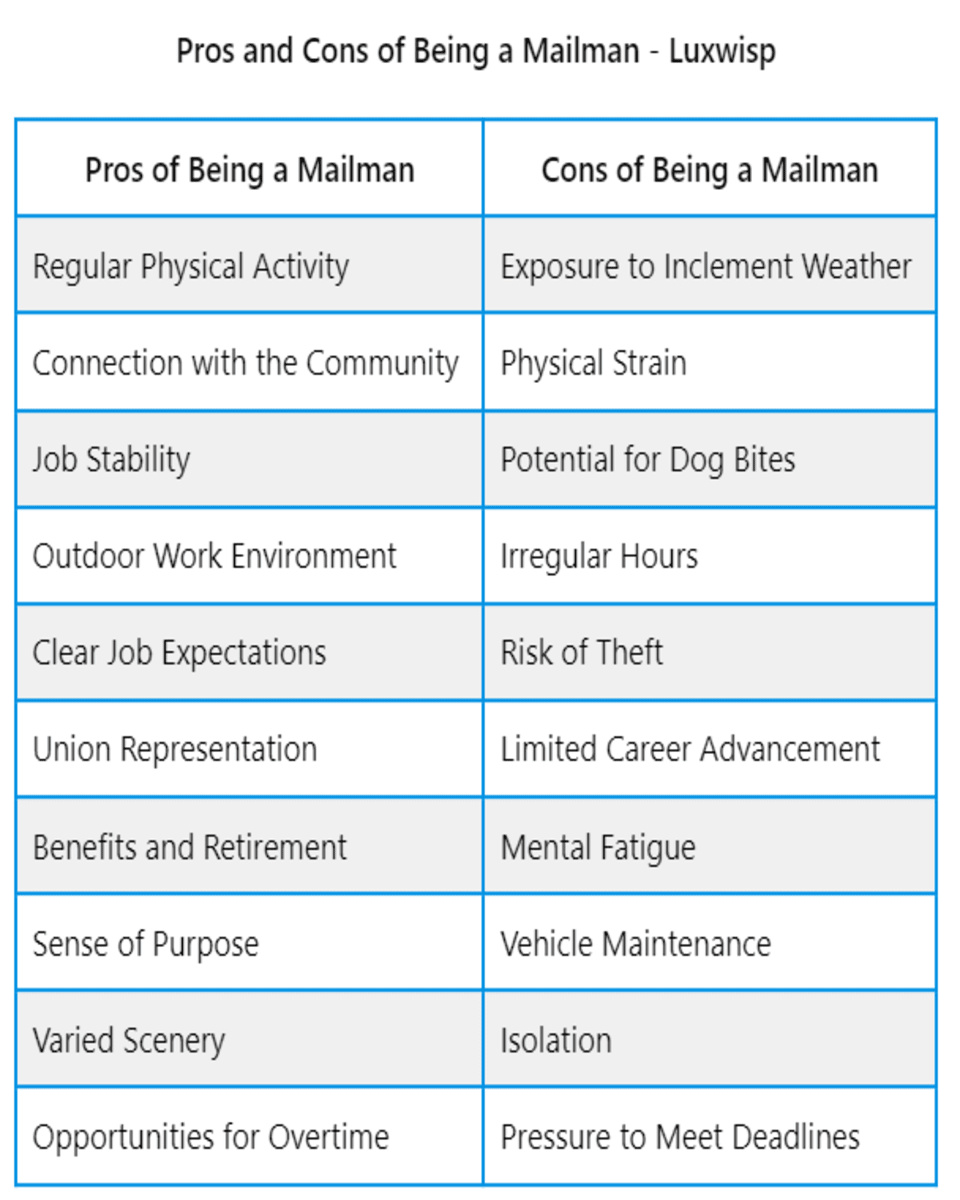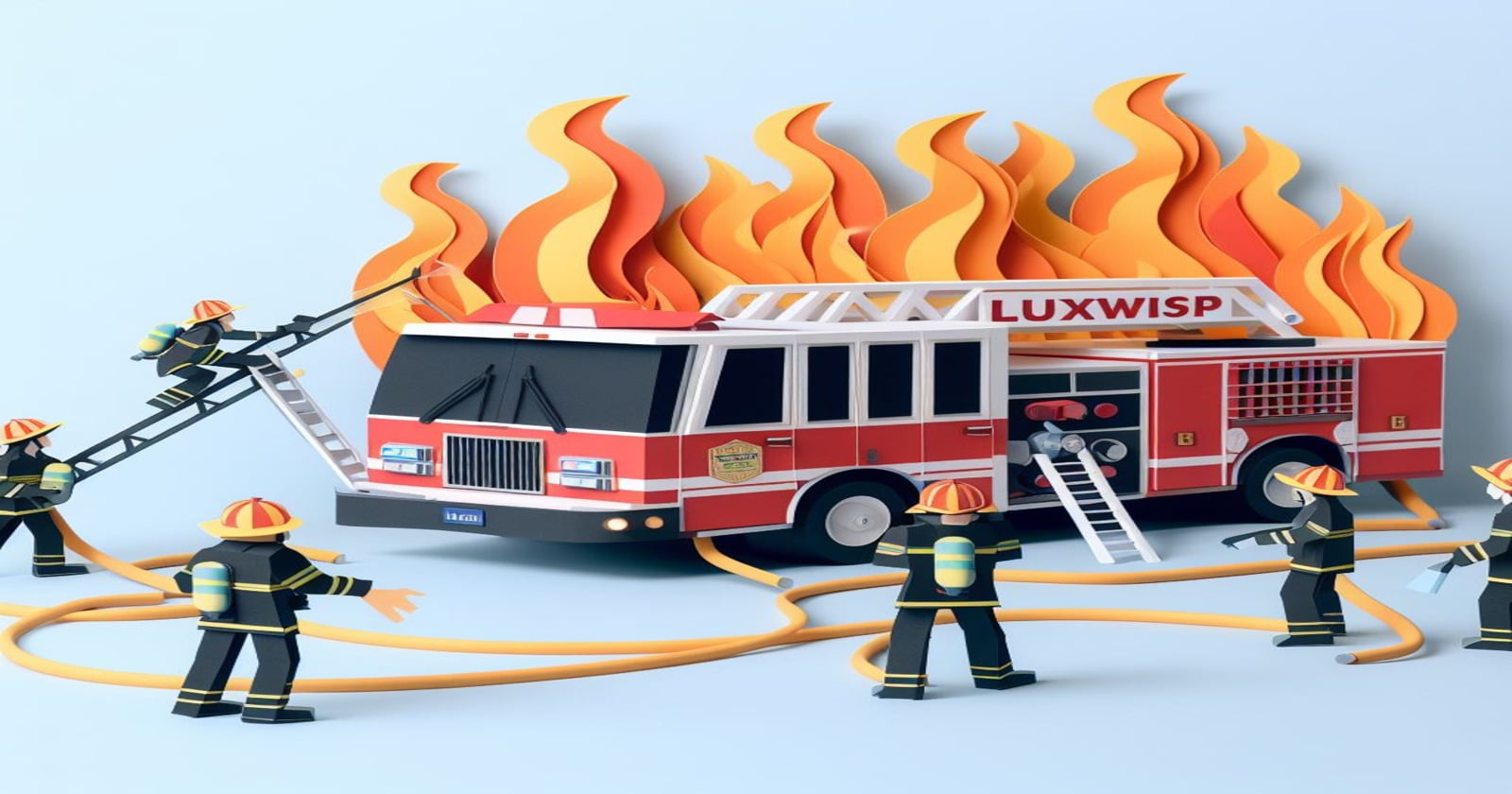The pros of being a mail carrier include job security, a sense of community, and opportunities for career advancement. It promotes physical fitness and provides fresh air and a steady income. Additionally, working outdoors, independently, and without the need for a college degree are significant advantages.
The cons of being a mail carrier involve physically demanding work, risks associated with the job, long work weeks, and unpredictable days off. Mail carriers often face extreme weather conditions and are at risk of skeletal ailments. The job can also lead to increased risk of injury.
Key Takeaways:
- Job security and stable income
- Regular pay schedule
- Community interaction and personal connection
- Working outdoors and physical benefits
Mail Carrier Fact Sheet
- 2022 Median Pay: $53,680 per year (BLS).
- Hourly Rate: $25.81.
- Entry-Level Education: No formal educational credential.
- Work Experience: None required.
- Training: Short-term on-the-job training.
- Number of Jobs in 2022: 504,300.
- Job Outlook for 2022-32: -8% (Decline).
- Employment Change from 2022-32: -39,000.
- Work Environment: Clerks, sorters, and processors work indoors; carriers work outdoors.
- Education for Entry: Mostly high school diploma.
- Requirement: Must pass a written exam.
- Projected Annual Openings: 34,400 (due to transfers and retirements).
- Demographics of Postal Workers:
- Gender Distribution: 42.7% women, 57.3% men.
- Average Age: 51 years old.
- Ethnicity Breakdown: 60.1% White, 13.4% Black or African American, 13.1% Hispanic or Latino, 9.3% Asian.
- Safety and Health:
- Reported Severe Injuries (2015-2016): 395, the most of any employer.
- Injury Risks: Higher likelihood of injuries and leaving positions than permanent employees.
- Common Causes of Injuries: Dog bites, slips and falls, vehicle accidents, repetitive stress injuries.
- Additional Information:
- U.S. Postal Service Offerings: Services at locations other than a Post Office, including self-service kiosks, contract postal units, approved postal providers, and village post offices.

| Pros of Being a Mailman | Cons of Being a Mailman |
|---|---|
| Regular Physical Activity | Exposure to Inclement Weather |
| Connection with the Community | Physical Strain |
| Job Stability | Potential for Dog Bites |
| Outdoor Work Environment | Irregular Hours |
| Clear Job Expectations | Risk of Theft |
| Union Representation | Limited Career Advancement |
| Benefits and Retirement | Mental Fatigue |
| Sense of Purpose | Vehicle Maintenance |
| Varied Scenery | Isolation |
| Opportunities for Overtime | Pressure to Meet Deadlines |
Pros of Being a Mailman

- Regular Physical Activity: Mail carriers spend a considerable portion of their day walking or moving, ensuring they get regular exercise. This can be beneficial for cardiovascular health and overall fitness. For those who prefer active jobs over sedentary ones, this is an ideal profession.
- Connection with the Community: Being a mailman offers an opportunity to interact with residents regularly. Over time, mail carriers often develop friendly relations with the people on their route, leading to a sense of belonging and connection with the community.
- Job Stability: The postal service is a long-standing institution that provides relatively stable employment. While there may be changes in volume or methods of delivery, the fundamental need for mail carriers remains consistent, ensuring job security for many.
- Outdoor Work Environment: Instead of being confined to an office, mail carriers work outdoors. This exposure to nature and varying weather conditions can be refreshing for those who enjoy being outside and can lead to better mental well-being.
- Clear Job Expectations: The duties of a mail carrier are clear and well-defined. This reduces ambiguity and ensures that workers know what’s expected of them daily, making the job less stressful in terms of role clarity.
- Union Representation: Many mail carriers are represented by unions, which can provide them with certain benefits, rights, and protections. This can lead to better job conditions, fair wages, and a platform to voice concerns.
- Benefits and Retirement: Mail carriers often receive comprehensive benefits packages, including health insurance and retirement plans. These benefits can lead to a secure future and peace of mind for the employee and their family.
- Sense of Purpose: Delivering mail is an essential service that people rely on. Mail carriers often feel a sense of pride and purpose in ensuring that parcels, letters, and important documents reach their intended recipients.
- Varied Scenery: Every day can be slightly different in terms of the route or the scenery. This variety can make the job more enjoyable for those who dislike monotonous environments.
- Opportunities for Overtime: Especially during peak seasons like the holidays, there’s often a chance for mail carriers to work overtime. This can lead to increased earnings and an opportunity to earn more than the base salary.
Cons of Being a Mailman

- Exposure to Inclement Weather: Mail carriers work in all kinds of weather, from blazing hot summers to freezing winters. This can be physically taxing and requires mail carriers to be prepared for any conditions.
- Physical Strain: The repetitive nature of walking, carrying heavy bags, and navigating uneven terrain can lead to physical strain or injuries. Over time, the demands of the job can take a toll on the body.
- Potential for Dog Bites: One of the known hazards of being a mail carrier is the risk of dog attacks. Even with precautions, there are instances where mailmen face aggressive animals on their routes.
- Irregular Hours: Some mail routes may require early starts, late finishes, or work on weekends. This can disrupt personal schedules and make it hard for mail carriers to maintain a work-life balance.
- Risk of Theft: Mail carriers sometimes handle valuable items or documents. This can make them targets for theft, posing a safety risk.
- Limited Career Advancement: While there are supervisory roles within the postal service, the direct upward mobility for a mail carrier might be limited. This could result in a feeling of career stagnation for some.
- Mental Fatigue: The repetitive nature of the job, combined with the need to be constantly alert to potential hazards, can lead to mental fatigue. This can impact job satisfaction and overall well-being.
- Vehicle Maintenance: For mail carriers who drive, there’s the added responsibility of maintaining their vehicle, which can be an added expense and stressor.
- Isolation: Although mail carriers interact with the community, a significant portion of their day might be spent alone. This can lead to feelings of isolation for some individuals.
- Pressure to Meet Deadlines: There’s often pressure to complete the mail route within a certain timeframe. This can be stressful, especially on days with a higher volume of mail or unexpected delays.
Benefits of Being a Mailman

Why is being a mailman considered a desirable career choice?
Being a mail carrier offers numerous advantages that make it an appealing career option for many individuals. One of the key reasons is the high demand for mail carriers. In an era where digital communication is prevalent, the need for physical mail delivery remains substantial, ensuring a consistent demand for mail carriers.
Additionally, the prospect of a steady income is an attractive feature of this profession. Mail carriers often benefit from stable and predictable remuneration, providing financial security.
Furthermore, the opportunity for advancement within the postal service is another compelling aspect. With dedication and performance, mail carriers can progress to higher positions, such as supervisors or managers, enhancing their career prospects.
Job security is also a significant advantage, as postal services are essential and enduring institutions in society. Moreover, the availability of pension and retirement benefits adds to the overall appeal of being a mailman, offering a sense of long-term financial stability.
These combined factors contribute to the desirability of pursuing a career as a mail carrier.
Negatives of Being a Mailman

Exposure to inclement weather and the potential for dog bites present significant challenges for mail carriers, requiring them to remain cautious and adaptable in their delivery duties. Additionally, irregular work hours can disrupt personal schedules, leading to fatigue and impacting overall well-being. The physical demands of the job, including walking long distances and carrying heavy loads, can result in repetitive stress injuries and physical exhaustion. Furthermore, the relatively low pay and limited opportunities for career advancement may pose financial challenges and lack of professional growth potential for mail carriers. These disadvantages highlight the demanding and sometimes hazardous nature of the job, requiring individuals to possess resilience, physical stamina, and a strong commitment to their work.
| Disadvantages | Impact |
|---|---|
| Inclement Weather | Physically taxing, requires adaptability and preparation |
| Dog Bites | Safety risk, necessitates caution and skill in handling aggressive animals |
| Irregular Work Hours | Disruption of work-life balance, potential for fatigue |
| Physical Strain | Risk of repetitive stress injuries, physical exhaustion |
Job Security

Job security is a key factor in considering the advantages and drawbacks of being a mail carrier. The high demand for mail carriers ensures a steady and stable income, making it an attractive career choice. With the postal service being a government agency, employees also benefit from additional job security. This is particularly advantageous as government jobs are generally considered to be more secure than those in the private sector.
The consistent demand for postal services, despite the rise of digital communication, further solidifies the job security for mail carriers. Additionally, access to benefits such as health insurance and retirement plans enhances the overall job security for individuals in this profession.
The stability and security offered by a career as a mail carrier can provide peace of mind and financial security for those seeking a reliable and established occupation. Overall, the job security associated with being a mail carrier is a compelling factor for individuals considering this line of work.
Stable Income
With a regular pay schedule and consistent paycheck, being a mail carrier provides a stable income for individuals in this profession. This stability offers several advantages, including:
- Effective Budget Planning: A predictable income allows mail carriers to plan their finances effectively, ensuring that they can cover their expenses and save for the future with confidence.
- Financial Security: The reliable nature of the income from being a mailman provides a sense of financial security, reducing the stress associated with fluctuating paychecks or uncertain work prospects.
- Reliability of Income: Mail carriers can rely on their income to meet their financial obligations, such as rent or mortgage payments, utility bills, and other essential expenses.
- Consistent Paycheck: Unlike some professions where earnings can vary significantly from month to month, mail carriers receive a consistent paycheck, offering peace of mind and stability in their financial lives.
Community Interaction

Being a mailman involves building trust and relationships with residents, which can be a rewarding aspect of the job.
However, it’s important to acknowledge the potential safety concerns that may arise when interacting with diverse individuals and navigating various neighborhoods.
This dynamic community interaction is a key aspect of the role that requires a balance of personal connection and situational awareness.
Building Trust and Relationships

As a mail carrier, fostering trust and building relationships with residents is a crucial aspect of the role, contributing to a strong sense of community connection and belonging. This interaction provides numerous benefits, including:
- Enhanced communication: Building trust allows for open lines of communication, making it easier to address any delivery concerns or special requests from residents.
- Increased security: Developing relationships with residents can lead to a heightened sense of security, as mail carriers become familiar with the regular comings and goings in the neighborhood.
- Supportive community ties: Strong relationships contribute to a supportive community environment, where residents look out for one another and offer assistance when needed.
- Personal satisfaction: Building trust and relationships can bring personal fulfillment, as mail carriers witness the positive impact of their service on the lives of the residents they serve.
Potential Safety Concerns
How can mail carriers ensure their safety while engaging with the community? It’s important for mail carriers to be aware of potential safety concerns when interacting with the community. From loose pets to unfamiliar neighborhoods, mail carriers must navigate various challenges while delivering mail. Here’s a look at some potential safety concerns and strategies to address them:
| Potential Safety Concerns | Strategies for Addressing |
|---|---|
| Loose pets | Carrying treats to distract or calm them |
| Unfamiliar neighborhoods | Using GPS and maps for navigation |
| Adverse weather conditions | Wearing appropriate gear for protection |
| Unsecured properties | Reporting any suspicious activity to authorities |
| Uneven pathways | Using proper footwear for stability |
Working Outdoors

Mail carriers are regularly exposed to varying weather conditions while working outdoors. This aspect of the job presents both advantages and disadvantages:
- Exposure to Nature: Working outdoors allows mail carriers to experience the changing seasons, natural landscapes, and fresh air, which can be refreshing for those who enjoy being outside.
- Potential for Better Mental Well-Being: Being surrounded by nature can have a positive impact on mental health, potentially reducing stress and improving overall well-being.
- Regular Exercise and Physical Activity: The nature of the job requires mail carriers to walk long distances, climb stairs, and carry heavy loads, providing them with regular exercise and physical activity.
- Beneficial for Cardiovascular Health and Overall Fitness: The physical demands of the job can contribute to improved cardiovascular health and overall fitness, as the consistent movement and physical exertion help to keep mail carriers active and fit.
Working outdoors as a mail carrier offers the opportunity to connect with nature, engage in regular physical activity, and potentially experience improved mental and physical well-being. However, it also comes with the challenge of being exposed to various weather conditions, which can be demanding and uncomfortable at times.
Physical Demands

Working outdoors as a mail carrier offers numerous physical demands, which are integral to the nature of the job. The constant movement involved in delivering mail requires mail carriers to be physically fit and capable of walking or biking for extended periods. Transporting heavy objects and carrying bulky items throughout the day are common tasks. Additionally, the endless amount of walking on the route every day can be physically taxing, especially in various weather conditions.
Some weeks may require heavy lifting at every house, further adding to the physical demands of the job. As a result, mail carriers need to have strength, endurance, and resilience to meet these physical demands consistently. It is crucial for individuals considering this profession to be aware of these physical requirements and to maintain their physical fitness to perform the job effectively.
While the physical demands can be challenging, they also provide an opportunity for mail carriers to stay active and maintain good physical health as part of their daily work routine.
Frequently Asked Questions
What Are the Career Advancement Opportunities for Mailmen?
Mail carriers have various career advancement opportunities, including the potential for promotion to higher positions within the postal industry. With union representation, opportunities for overtime work, and room for professional development, mailmen can pursue a fulfilling and progressive career.
How Does Being a Mailman Impact Work-Life Balance?
Being a mailman can positively impact work-life balance due to regular hours, minimal supervision, opportunities for overtime, and limited early morning or nighttime work. These factors allow for effective time management, free weekends, and reduced stress.
What Are the Typical Hours and Schedules for Mailmen?
Mailmen typically work 8-hour shifts, with regular hours varying from 7 AM to 6 PM. Schedules may fluctuate during peak seasons. For example, during the holidays, they may work longer hours to manage increased mail volume.
Are There Any Specific Educational or Training Requirements to Become a Mailman?
To become a mail carrier, a high school diploma is typically the minimum educational requirement. Additional training may be provided by the postal service. Advancement into management roles may necessitate higher degrees in the future.
How Does Being a Mailman Impact Mental Health and Job Satisfaction?
Being a mailman can positively impact mental health and job satisfaction due to physical fitness, independent work, community interaction, varied work environment, and job benefits. These factors contribute to better well-being and work-life balance.













